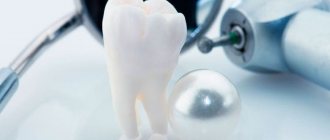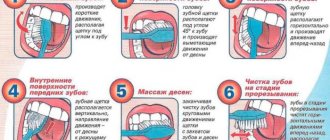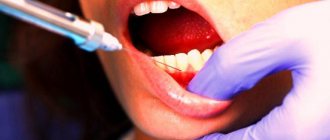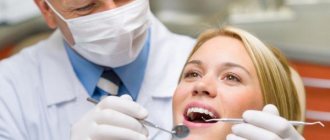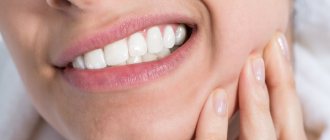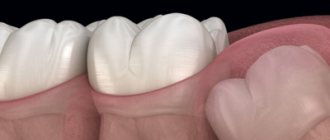- About the procedure
- Is it possible to brush your teeth during pregnancy?
- Stages of ultrasonic teeth cleaning
- Effect of the procedure
- Cost of professional teeth cleaning during pregnancy
Every woman knows that it is necessary to prepare for pregnancy several months before conception. It is very important to prepare your body for such changes. The health of your baby largely depends on your condition. The girl visits various specialists, and, of course, she must meet with the dentist. In order to cure all teeth before pregnancy. The fact is that our bones and teeth consist of calcium, phosphorus and other components, and with the development of a new life, the body requires more of these useful microelements. Since most of the minerals will be spent on the structure of the baby’s skeleton, if they are deficient, the necessary components will be borrowed from the bones of the expectant mother’s teeth. As a result, the condition of the dental units will deteriorate, creating a favorable environment for the development of caries. That is why all dentists are attentive to the treatment of pregnant women. An excellent opportunity to maintain oral health throughout the nine months and in general is professional teeth cleaning during pregnancy. In this article we will talk about whether this procedure can be done for expectant mothers, whether it is safe, and what effect should be expected.
Teeth cleaning
| Service | price, rub. |
| Initial consultation with a doctor | For free |
| Comprehensive professional hygiene (including ultrasonic removal of dental plaque, Air-flow, polishing, varnishing) | 4000 |
| Ultrasound removal of tartar – 1 tooth | 400 |
| Removal of pigment plaque with the “Air-flow” system – 1 tooth | 400 |
| Plaque removal using the Air-flow method – 2 jaws | 3300 |
| Ultrasonic dental plaque removal – 2 jaws | 3300 |
| Teeth whitening Opalescence Boost | 12000 |
| Skyce installation (including the cost of decoration) | 2000 |
All initial consultations are free.
Is it possible to brush your teeth during pregnancy?
Many expectant mothers avoid any non-urgent medical procedures for fear of harming the baby. Professional teeth cleaning during pregnancy also falls into this category: nothing seems to hurt, so why the extra movements and expenses?
However, brushing your teeth during pregnancy is not only possible, but necessary. During this period, all processes in a woman’s body proceed somewhat differently, so the gums, teeth and the entire oral cavity require special attention.
It is important to understand that professional teeth cleaning during pregnancy helps to avoid serious dental diseases and interventions associated with their treatment. At the same time, the risk of developing gastrointestinal diseases is reduced, teeth become whiter, and the smile looks even more attractive.
Can anesthesia be used during pregnancy?
For pain relief, it is recommended to use hypoallergenic local preparations. They are well tolerated, do not cross the placenta, and do not harm the baby. Anesthetics containing large amounts of adrenaline should not be used. It can provoke muscle spasms and increase the tone of the uterus, which increases the likelihood of miscarriage. Such drugs are prohibited for pregnant women. The dentist must be specifically warned that they should not be used.
Simple treatment for incipient caries can be performed without anesthesia if the woman tolerates it well. It does not affect the nerves and does not cause discomfort. If complex intervention or surgical procedures are needed, they are carried out only for urgent indications (acute inflammation, dental injuries, etc.). In other cases, treatment is delayed until the postpartum period.
Current promotions!
Implantation in installments regularly
The promotion operates regularly and applies to patients who require implantation.
What is professional hygiene and why do pregnant women need it?
The most modern and very useful device for home hygiene is an irrigator. It not only helps clean out food debris in hard-to-reach places, but also massages the gums when used correctly and regularly.
However, unfortunately, daily home treatments cannot fully ensure ideal oral health without professional procedures. It is possible to completely remove soft plaque in hard-to-reach places, and most importantly, hard dental deposits only with professional teeth cleaning, which is required even more often during pregnancy.
To the question whether it is possible to clean tartar for pregnant women, modern dentistry gives an unequivocally positive answer. Teeth cleaning for pregnant women is usually carried out in a standard manner, but the doctor always takes into account the individual characteristics of the patient, clinical manifestations, general condition, term and well-being of the expectant mother, as well as her mood and wishes.
What is included in the complex of professional hygiene for pregnant women
The standard complex includes the following steps:
- Complaints, examination and history taking
. The doctor examines the oral cavity, asks the patient questions about health, well-being, the presence of chronic diseases, allergic reactions, and the course of pregnancy. - Removal of tartar
using an ultrasonic device, and removal of pigmented plaque with the Air Flow system. To remove tartar, pregnant women most often use ultrasonic cleaning. To remove soft plaque during pregnancy, Air Flow is used, but with limitations, which we will talk about below. - Grinding and polishing
. Grinding and polishing of teeth is done using a machine brush and a special paste. After polishing, the surface of the teeth becomes shiny and absolutely smooth. This gives a pleasant visual effect (teeth become whiter), a very pleasant sensation, and most importantly, the smooth surface prevents the accumulation of new plaque. - Coating of teeth with varnish
(remineralization). After all the manipulations, the doctor covers the surface of the teeth with preparations containing fluoride and calcium. This helps strengthen and restore tooth enamel, prevent caries and reduce tooth sensitivity. - Preventive actions
. During the consultation, the doctor gives recommendations on the specifics of dental care during pregnancy, proper nutrition, daily oral hygiene, rational choice of brushes and pastes, and teaches how to use dental floss and irrigator correctly.
Photos of the dental offices of the clinic Our Dentist in Krasnogorsk
(images are clickable)
Is it possible to remove tartar during pregnancy?
A pregnant woman's body works differently than it normally does. Physiological changes affect almost all organs and systems, including the oral cavity.
Pregnant women are more susceptible to dental diseases; the processes proceed faster and more aggressively. Periodontal tissues are also affected by pregnancy, and inflammation of the gums (gingivitis) and the tissues surrounding the tooth (periodontitis) often occurs. They become loose, quickly and easily inflame, are often injured by solid food, bleed and hurt.
- Immunity decreases
. This is a physiological process aimed at bearing a child (so that the fetus is not perceived by the mother’s body as something foreign). However, decreased immunity contributes to the exacerbation of chronic diseases and the body's vulnerability to infections. - Hormonal levels change completely
. Due to changes in hormonal levels, the acid-base composition of saliva also changes. It significantly loses its bacteriostatic and bactericidal properties. - Unhealthy eating habits are formed
. Many pregnant women sin with constant snacking, and the share of starchy and sweet foods increases significantly, which aggravates the situation, since food remains are almost constantly present in the oral cavity. In combination with other processes, this significantly accelerates the proliferation of bacteria, and it becomes increasingly difficult for the body to suppress their activity. - There is a deficiency of vitamins and microelements
. During the formation of a child’s organs and systems, the need for microelements increases significantly. The need for calcium is especially high: it is the main material for the formation of the baby’s skeleton, nails and teeth. With its deficiency, the mother’s body intensively “gives” all the incoming calcium to the fetus, and due to the resulting deficiency, its own tissues begin to deteriorate, primarily the teeth. - Insufficient attention is paid to oral hygiene
. Bleeding and swelling of the gums, increased sensitivity of teeth are common complaints among women. Brushing teeth for pregnant women often causes discomfort, so some people simply refuse it. It turns out to be a vicious circle: the less often you brush your teeth, the faster plaque accumulates and mineralizes, and the worse the condition of your teeth and gums.
The nuances of professional teeth cleaning for pregnant women
Many women ask the doctor the question: is it possible to clean tartar during pregnancy? Of course it is necessary. However, it is better to do this in advance, at the planning stage, just like a full renovation.
Professional hygiene carried out before pregnancy will not save you from the need to repeat the procedure in the next 9 months, because doctors recommend repeating the hygiene complex twice a year. However, the amount of work, and therefore possible problems, will be much less.
During this period, you need to visit the dentist even more often, approximately once every 3-4 months. Regular brushing of teeth during pregnancy will make it possible to use the most gentle methods possible, practically without resorting to an ultrasonic scaler.
Ultrasonic cleaning for pregnant women and their babies is not harmful, but can cause discomfort due to increased tooth sensitivity, gum inflammation or other unpleasant symptoms.
Our dentists try to carry out the procedure as gently as possible. We choose tactics depending on the specific case, based on the woman’s condition, characteristics and duration of pregnancy.
The optimal time for ultrasonic cleaning for pregnant women is the second trimester
. During this period, you can get rid of even old deposits with minimal risks. Whether it is possible to remove tartar for pregnant women at an earlier or later stage is decided individually, depending on the condition of the teeth, gums, and general well-being of the pregnant woman.
If there are advanced deposits, cleaning may cause pain. If for other patients this manipulation can be performed under injection anesthesia and even sedation, then in the case of pregnant women, doctors use more gentle application methods. They consist of using safe pain-relieving sprays and gels.
Is it possible to do ultrasonic teeth cleaning for pregnant women?
Ultrasonic cleaning for pregnant women involves the use of a special device - an ultrasonic scaler. The device generates ultrasonic waves of a given frequency, which easily and quickly destroy hard dental deposits.
This is an absolutely safe method for both the woman and the baby. The effects of the scaler are similar to those experienced by a child during routine ultrasounds, so there is no need to worry about unwanted reactions in this regard.
When considering the question of whether it is possible to do ultrasonic cleaning of a pregnant woman’s teeth, the dentist not only takes into account the nature of the deposits and gestational age, but also finds out whether there are any contraindications to the procedure.
In particular, ultrasonic cleaning for pregnant women does not include increased tooth sensitivity, exposure of tooth necks, or the development of cervical caries.
Air Flow during pregnancy: are there any contraindications?
Air Flow is one of the most popular procedures, an ideal way for high-quality professional dental hygiene. In this case, the destructive effect on plaque is carried out using a device that supplies a water-abrasive mixture. The Air Flow technique is the most effective for removing pigmented soft plaque. If there is no tartar, then this is enough for high-quality cleaning of hard-to-reach places from dental plaque.
Air Flow is used with some restrictions during pregnancy. General contraindications include bronchial asthma, allergies, specific rhinitis (runny nose) of pregnant women, and increased sensitivity of teeth. But this does not mean that the question of whether it is possible to brush your teeth during pregnancy should be given a negative answer. In such cases, doctors use traditional mechanical methods of plaque removal.
Prevention of dental and gum diseases during pregnancy
Oral hygiene is one of the most important tasks facing expectant mothers. With improper or insufficient care, the condition of teeth and gums can seriously deteriorate in just a few weeks.
Fortunately, in most cases, to prevent dental diseases, regular hygiene procedures, periodic professional cleaning and following simple nutritional rules are sufficient.
For the health of gums and teeth during pregnancy, it is recommended:
- Brush your teeth not only in the morning and evening, but also every time after a meal (even a snack).
- Choose brushes with soft bristles and therapeutic and prophylactic pastes containing calcium, phosphates, magnesium, fluorides, and medicinal plant extracts.
- Use mouthwash (without ethyl alcohol), dental floss, and irrigator.
- Eat rationally, maintaining the optimal amount of vitamins C, A, D, E and group B, calcium, phosphorus, fluorine, magnesium, other trace elements and mineral salts.
- Do not skip routine dental examinations and strictly follow the doctor’s recommendations.
If you visit the dentist for cleaning once every 3-4 months, microbial plaque simply will not have time to mineralize, that is, turn into tartar. This means that there will be no need to use ultrasound and air flow, and the risks of developing serious dental diseases will be minimized.
We invite you to the dental clinic “Our Dentist”. At a free consultation, the doctor will assess the condition of your teeth and gums and give recommendations on their treatment and hygiene. Make an appointment by phone or through the website and our dentist will be yours!
Your calls are always welcome! 8 915-367-04-47 - call, make an appointment, come for a free initial consultation, and Our Dentist will become yours!
Dear patients! All prices on the site are valid only at the time of publication. The specialist will inform you about the exact cost and scope of necessary procedures after consultation.
Author of the material: Chief Dentistry Doctor “Our Dentist” Oleg Nikolevich Sharmay.
Procedures that should not be done
- Installation of veneers or aesthetic fillings
Although it is not considered a risky procedure, it is nevertheless not recommended. The reason is that any medical interventions during pregnancy should be carried out only when indicated. Aesthetic problems can be solved after the birth of a child.
- Whitening
The reason is the same - the procedure is not therapeutic - it can be postponed until later. In addition, now all medical drugs and equipment are certified; for this purpose, studies are carried out, in which pregnant women usually do not participate. Therefore, there is a formal ban.
- Treatment by an orthodontist
It would seem that wearing braces while on maternity leave is a great idea, because you don’t have to go to work or communicate with colleagues. But in fact, many orthodontists are against this decision. Firstly, during pregnancy and subsequent breastfeeding, bone tissue density may temporarily decrease and the course of treatment will differ from the standard. It is difficult to predict this, so to some extent such a procedure is risky. Secondly, immediately after the birth of a child, a woman cannot always leave him to go to the clinic for an appointment on the appointed day. And it is very undesirable to postpone visits to the orthodontist - it is not recommended to violate the treatment schedule.
It is much easier to choose clear aligners that are invisible to others, and undergo treatment when it is truly convenient for you.
There is no need to “hide” with aligners; the treatment goes unnoticed by others
Thus, the general opinion of dentists is:
- Treatment should be carried out before pregnancy or after 12 weeks.
- Do not put off treatment until later.
- On the contrary, all aesthetic procedures can be completed after the birth of the baby.
Other articles:
- What is more profitable – aligners or braces?
- Reflections braces - their advantages
Our certificates
Why do you need to get rid of soft deposits and tartar?
Excess hormones, lack of minerals and vitamins, and impaired metabolism lead to swollen and bleeding gums in pregnant women. Even if pregnancy is absolutely uncomplicated, approximately every fifth woman still experiences gingivitis in the first or second month, an inflammatory disease of the gum tissue.
- Every third pregnant woman notes an increase in the production of saliva, which contributes to the formation of soft plaque on the lower incisors and canines. It is near them in the oral cavity that the excretory ducts of the submandibular salivary glands are located.
- Due to toxicosis, which provokes vomiting, the environment in the oral cavity becomes more acidic. The acidity level is increased by the acid added to the stomach. This destroys tooth enamel and accelerates processes that cause hardening of soft plaque.
- The resulting hard deposits gradually spread downwards, under the gum, causing the formation of dental pockets and peeling of the gum tissue.
If you do not clean the tartar in a timely manner, the gums will turn red and swell, partially covering the dental crowns, become painful and bleed, especially when performing hygiene procedures. An unpleasant odor will settle in the oral cavity. The woman will have difficulty chewing food. Bleeding gums provoke the spread of infection through the bloodstream, which can cause serious harm to the body of the expectant mother and fetus.

